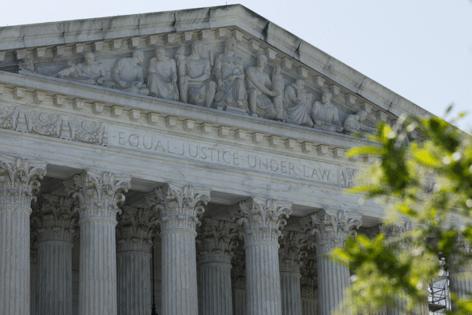Supreme Court will hear case on post-Election Day ballot counting
Published in News & Features
WASHINGTON — The Supreme Court said Monday it would hear arguments in a case challenging a Mississippi state law allowing the state to count ballots in federal elections that arrive after Election Day.
Monday’s order came after Mississippi asked the justices to overturn a decision by the U.S. Court of Appeals for the 5th Circuit that found that federal law setting Election Day trumped the state statute, and would not allow the counting of late-arriving ballots in federal elections.
In the petition, the state argued that states should be allowed latitude to make sure their citizens’ votes count in federal elections, and the decision risked post-Election Day legal chaos in next year’s midterms.
“The stakes are high: ballots cast by — but received after — election day can swing close races and change the course of the country,” Mississippi’s petition said.
The justices will likely hear arguments in the case and issue a decision by the end of the court’s term next June.
Mississippi, and a group of state-based organizations defending the law, argued that about 30 states allow the counting of ballots that arrive after Election Day, and upholding the 5th Circuit decision invites nationwide litigation and “risking chaos” in the congressional midterms and beyond.
If the justices let the 5th Circuit decision stand, the state argued, frustrated candidates and groups across the country could use it in last-minute challenges to election results.
The case granted Monday started when the Republican National Committee, Mississippi Republican Party and a Mississippi Republican voter challenged the state’s law last year.
The state law allows election officials to count mail-in ballots postmarked by Election Day that arrive up to five days after Election Day.
Initially a trial judge ruled in favor of the state, finding that the federal law setting Election Day did not override the state’s ballot-counting law.
Then the RNC appealed the case to the 5th Circuit, where a three-judge panel ruled in their favor. The 5th Circuit decided that federal law means that ballots must both be cast by voters and received by state officials on Election Day, and invalidated the state law.
The full 5th Circuit declined to rehear Mississippi’s case and the state then asked the Supreme Court to weigh in.
In its own Supreme Court filing, the RNC argued that state laws like Mississippi’s “deprive the electorate of a clear nationwide deadline” for elections. The RNC asked the justices to not take up the case and let the 5th Circuit decision stand.
The Supreme Court already heard a case this year brought by Rep. Mike Bost of Illinois and Republican presidential electors who sought to revive their challenge to an Illinois state law that allows the state to count ballots that arrive up to 14 days after Election Day.
The Supreme Court in that case, unlike the case it granted for arguments Monday, was not considering the merits of Bost’s challenge to the Illinois law. The justices have not yet issued a decision in the case brought by Bost.
Counting ballots that arrive after Election Day has been a continuing legal issue and formed a major basis in several of President Donald Trump’s failed lawsuits challenging state voting in states he lost in the 2020 election.
The case is Watson v. RNC.
©2025 CQ-Roll Call, Inc., All Rights Reserved. Visit cqrollcall.com. Distributed by Tribune Content Agency, LLC.







Comments